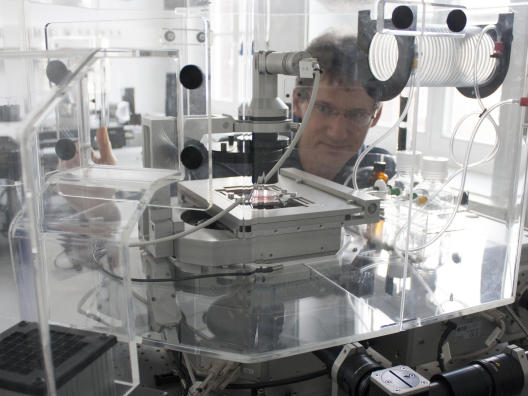New microscope helps exploring the organised chaos in cells

The new Institute of Cell Dynamics and Imaging was inaugurated by CiM professor Roland Wedlich-Söldner and his team on November 27th, 2013. During a lab tour the guests could take a look at a new ultra-modern microscope that combines three optical microscopy techniques in one.
Wedlich-Söldner and his six-strong working group investigate organisation principles of cells. The team already found that yeast cells organise their entire surface in hundreds of so-called domains that are clearly separated from each other and contain unique combinations of protein types. This organisation which is described as ‘molecular patchwork’ by Wedlich-Söldner seems to be of central importance for fundamental processes in the cell: It was found that proteins that were transferred to a foreign domain partially lost their functionality.
In further investigation of these dynamic processes in cells, the new microscope will help. The Cells-in-Motion Cluster of Excellence invested 420,000 euros in that. The special feature of the microscope is that it combines three different microscopic methods which allow for precise and detailed visualisation of certain components of the cell membrane: ‘Fluorescence recovery after photobleaching (FRAP)’, ‘Total internal reflection fluorescence microscopy (TIRFM)’ and – that’s new – the confocal laser microscopy technique ‘spinning disc’ that permits extreme fast imaging of dynamic cell behaviour. ‘By combining the methods in one unit we can get as much information as possible out of the same cell’, explains Roland Wedlich-Söldner . ‘This is of great importance as the processes that we observe often happen within seconds or even milliseconds’. Switching between different devices would take too long time. Another advantage of the device is the intuitive usability, says Wedlich-Söldner. In many advanced methods support from the technical side is necessary, however, the new microscope can be taken into operation by each biologist within a single morning. Members of the Cluster of Excellence are welcome to contact Roland Wedlich-Söldner, if interested in using this instrument.
Contact
Univ.-Prof. Dr. rer. nat. Roland Wedlich-Söldner
wedlich@uni-muenster.de

